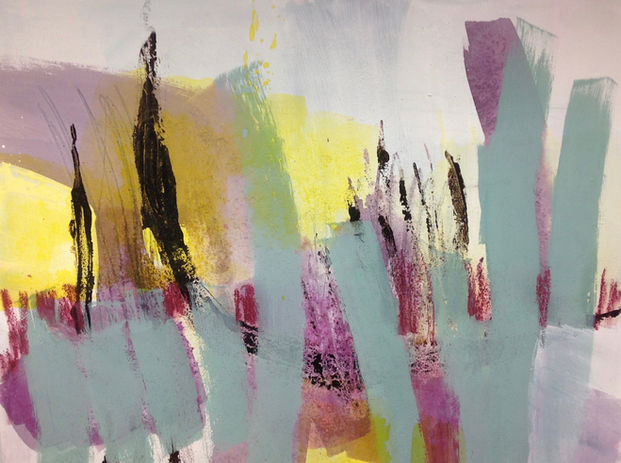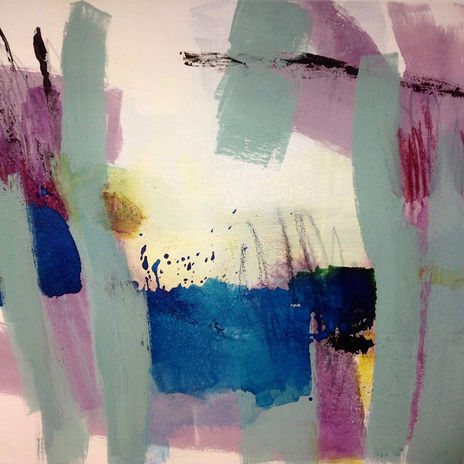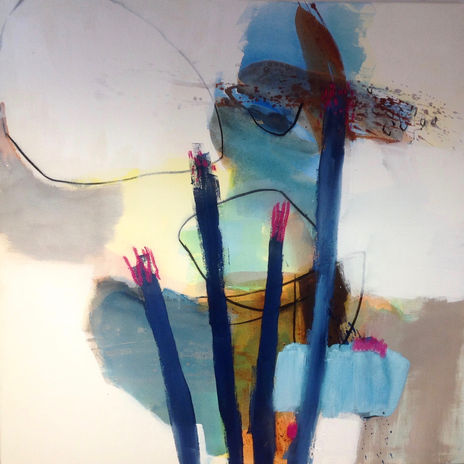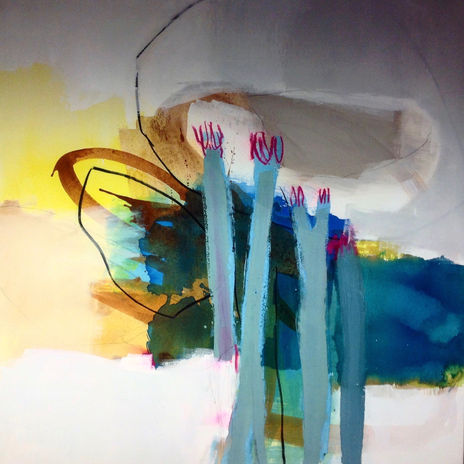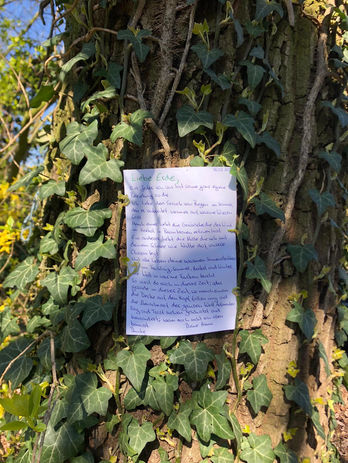
NOW!topia
an online exhibition

How does NOW!topia work?
NOW!topia was about to be an exhibition hosted by Kaleido in Maastricht. Due to Corona, we changed plans: Welcome to our online exhibition!
Every day, from the 23rd till the 26th of March 2020,
a new artist and artwork will be posted here. So don’t forget to visit NOW!topia every day until the 26th of March!
About NOW!topia
In these current times it is becoming overwhelmingly clear that we surpassed our planetary boundaries through our ways of production and consumption. Our economies thrive when they grow exponentially at costs of the earth’s resources, just to serve a tiny fraction of the human species in the Global North. We are witnessing an increasing growth of natural disasters, such as destructive forest fires and flooding’s, extinction of species in flora and fauna, just so our growth-based economy can continue to exist.
In short, we have forgotten that planet earth is a shared space. Forgotten how to work with nature, our home, instead of against it.
The aim of the exhibition NOW!topia is however not to show its visitors how bad things have become, or an invite to a cynical dance of no return. The aim of the exhibition is to envision alternative and positive futures for Planet Earth. These futures should not be u- or dystopian, but rather feature viable pathways which, however, need to be actively worked towards. As Buckminster Fuller stated: ‘you never change things by fighting the existing reality. To change something build a new model that makes the old one obsolete.’
We believe that the creation of this new model starts with the imagination. Since everything is connected, we believe this new model arises out of interdisciplinarity where creative and innovative thinking are key factors. We invited artists to take part in the exhibition NOW!topia, and therefore contribute in the co-creation of a new paradigm.
Pressing matter:
The corona crisis is a window of opportunity, since as typical for a global crisis, it fundamentally shifts the spaces of what is possible. It's time for love, solidarity and creative ideas. Enact NOW!topia.

Exhibitions
Monday 23rd of March
Candlelight
George Courtens
A surrealist landscape as link to the possibilities of a new growth agnostic paradigm. Check it out!
Transformative Imagination
Omar Neshawy & Lara Stammen
A Series of photographs spanning the transition to Nowtopia through imagination. Check it out!
Tuesday 24th of March
Deceptive Virus
Sam Coenen
A digital art piece featuring the grotesque face of the invisible and yet so omnipresent virus which sweeps the world. Check it out!
Seedlings
Nanni Wagner
In two series of paintings, she explores the vanishing of the old in light of new awakenings. Her work reflects on processes of decay and new life and can help to shed a more nuanced light on growth: Not all growth is bad. Check it out!
Thursday 26th of March
Workshop: Love Letters to Earth
Wednesday 25th of March
Human collaboration
What do you want to protect?
What do you want to leave behind?
What is your NOW!topia?
Send us a photograph of your love letter to earth. Check it out!
Transformative imagination
Omar Neshawy & Lara Stammen
The International Futures Forum proposes for imagination to span three horizons: (1) the current way of doing things; (2) the future/new way of doing things; and (3) the transition or transformation zone between them.
scroll
Candlelight
By George Courtens

It seems as if in this surrealistic artwork, the unknown woman shows you through the light of her candle into a mysterious land, where the houses are colored blue, and the roads are colored orange. It is obvious that the depicted landscape is an imagination. It cannot be, and never will be real.
Lots of people tend to believe that society based on a de-growth economy, where a fulltime work week could be 3 days a week, where people don’t own private houses but live in shared communities, where people share their time and food and where material does not ensure prestige but kindness does, is the same imagination as the one you see in Candlelight.
Yes, it might sound utopian, but when you really think about it, how weird is it actually to imagine a life where you merely focus on the things that really matter?
Tim Jackson, a British ecological economist and professor for sustainable development at the University of Surrey, describes our current, growth-based economy as follows: this is a strange, rather perverse story, it’s a story about us, people, who are being persuaded to spend money we don’t have on things we don’t need, to create impressions that won’t last, on people we don’t care about.
Keep in mind that both, growth-based economies as well as post-growth economies, are models imagined by humans.
The question is, which imagination do you want to be real? Which one is your NOW!topia?
Want to learn more about post-growth economies? Tim Jackson shares his thoughts here!
Before, earth experienced 10,000 years of climatic stability, the Holocene. We successfully changed that through the Industrial Revolution, mainly the heavy extraction of fossil fuels, yay.
But as David Wallace-Wells puts it in the uninhabitable Earth: ‘we all suffer from an incredible failure of imagination’.

1. Welcome to the Anthropocene
Where humans have become geological agents.
Geo-what?
It basically means we have become a force changing the basic physical processes on earth: climate change, the mass-extinction of species, the melting arctic, ocean acidification and the list goes on.

2. Welcome to NOW!topia
When can we stop growing?
What if the equation
more wealth = more happiness
has an expiration date
which many of us already surpassed?
What if we reconfigure joy and desire?


Stop talking and start listening
Stop defending and start hearing
Stop taking and start giving
Stop pursuing and start holding still
Stop striving for more and start being with less or loss
Stop guarding the I and start making space for more than I
which over time may become
we
Susanne Moser, Transformation Conference (2013)
What are you focusing on in quarantine?
scroll
By Omar Neshawy
3. The Transition
Since we all know, that the caterpillar will change into a butterfly. But does the caterpillar know?
The metamorphosis of the world is similarly unforeseeable for us. We are its cause as well as its product.
(Ulrich Beck, the metamorphosis of the world)
We are in the transition, whether we realize or not. But what is our role within all this?
CREATIVES TO THE RESCUE (Check out the podcast our friends made on how Creatives come up with solutions to build a regenerative future)
And don't forget: the next part of NOW!topia is coming up!
SEE YOU TOMORROW!

Deceptive Virus
By Sam Coenen
Let go of your illusion of control and embrace uncertainty. Already planned a Corona afterparty? Nice and easy, but be aware that Corona surely won’t be the last global crisis you’ll witness. Climate change fosters many of them, disasters will pile up. This is not a dystopian nightmare or mere speculation. So, don’t close your eyes and wait until this one is over, because the Corona Crisis is not a unique one-time thing.
Sam Coenen’s artwork confronts its viewer face-to-face with the grotesque grimasse of the Corona virus. Depicted with a sense of innocence, the face of the virus does not seem as ground breaking as it actually is. This deceptiveness led us to believe we could continue our lives without adapting our social existence, which gave the virus the possibility to spread into the scale of a pandemic. Wait - do you also see similarities with climate change??
But, on a positive note, only a crisis – actual or perceived – produces real change. When that crisis occurs, the actions that are taken depend on the ideas that are lying around. (Milton Friedman)
In other words, crisis are windows of opportunities to make quick drastic changes to policy. Isn’t it that what many of us are craving for? Well, this window of opportunity is principally open for any ideas out there, they just need to be brought forward through structured organization. That is why often the rich and powerful have achieved to bring forward their ideas, which are beneficial especially to themselves. Benefiting from public disorientation and chaos, they push through their agendas, radicalizing neo-liberal policies as we have seen it after the Global Financial crisis (maybe re-read Naomi Klein's Shock Doctrine on the matter.) But doesn´t it go the other way around as well?
Talking about NOW!topia, the procedures taken to reduce the spread of the corona virus
can be seen in the light of questioning our omnipresent growth narrative and establishing a mindset, showing that another world is not only possible but already becoming a reality: people stopping mass consumption by staying at home, people stopping mass production by not going to work, there is a sense of a world community where everyone feels the need for solidarity.
Prominent spreaders of social change are social movements, they too are dependent on such moments of opportunity to bring about disruption. But: social movements in times of social distancing? Challenging, but not impossible!! Protests are moved online and sit-ins become call ins. Check the links and get inspired!
scroll
Seedlings
By Nanni Wagner
Her current work ‘seedlings’ is all about natural growth. In two series of paintings (ink and pigment on 100x100 cm of canvas), she explores the slow vanishing of the old in light of new awakenings to strength and beauty. Her work reflects on processes of decay and new life and can help to shed a more nuanced light on growth: natural growth is something essential to life on earth.
Plants grow, but they don’t grow exponentially. If they do, they end up killing the base upon which they live. That is what our growth addicted economies are doing to planet earth right now. Economic growth has been cut loose of its purposes and has been declared an end in its own.
But should we not rather create economies that make us thrive, whether or not they grow instead of sticking with the economies that need to grow, whether or not they make us thrive?
That is what Kate Raworth asks in her book Doughnut economics, sparking the imagination in designing 21stcentury economics. So: what makes us thrive?
Often economic growth only benefits the ones that already have more than enough. Making the cake bigger to then just distribute it even more unequally DOES NOT MAKE SENSE.
What about a refocus on providing a just life to everyone, the setting up of resilient communities and networks and treating planetary boundaries with care?
We could refocus our economies on yoga classes, community gardening, art circles and care collectives. We could rethink the value that different jobs bring to society and thereby also re-evaluate the payment they receive.
Just like the layers in Nanni’s paintings, we must deal with the old, we cannot ignore it and just learn from it, paint over it, let new life grow. Disruptive moments such as the corona crisis can help release a n layer of fresh paint, with which we need to work, shape it into a desirable direction: don’t let another crisis pass, let’s transform the economy.
Workshop: Love Letters to Earth
Human Collaboration
Don't get bored, inspire yourself
The exhibition is over but we collected a few links that get you thinking, or: acting!
1.
Other Online Pop-Up Exhibitions !!
2.
3.
Consumption Fasting Challenge (for German speakers, but I mean just start your own!)
4.
What artists come up with during Corona...
5.
Corona & the Cultural Sector (SO many links!)
6.
Something else: Astronauts have tips for handling isolation!
7.
Four Scenarios for an After-Corona world (straight from the Future Institute)






